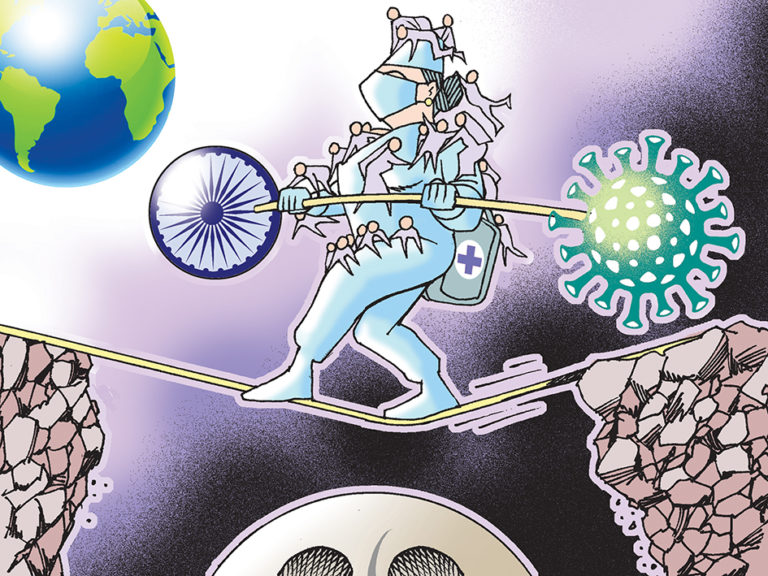The old idea that civilisation is destroyed from within, not from without, has been turned upside down. In just a few weeks a virus ten-thousandth of a millimetre in diameter has spread around the world like wildfire from a market in Wuhan, to threaten our civilised order. How we respond to the moral dilemmas raised by Covid-19 will reflect on our values and the number of lives we save.

The first dilemma: Given its horrific cost, was the lockdown necessary? President Donald Trump in America and Prime Minister Boris Johnson in the UK dawdled and both nations paid a heavy price. Johnson considered an alternative: Allow the virus to spread until most people get infected and become immune; with herd immunity, the outbreak would fizzle out. When told that 2,60,000 people would die so that the rest of the UK could live, he backed off.
India’s choices also became clear when faced with the consequences. Epidemiologists’ models predicted around 400 million Indians would be infected by end July – with 40 million severe cases – and at the peak, 10 million patients would have to be hospitalised. But India has only 1,00,000 intensive-care beds and 20,000 ventilators. Creating herd immunity would mean about half of India would need to be infected, and with a 1% mortality rate 6.5 million would die. This is not an imaginary exercise: 17 million Indians actually died in the 1918 Spanish Flu. Lockdown is, thus, the only answer.
The lockdown has worked in China and the world is implementing some variant of it. But social activists like Harsh Mander have argued against it because: 1) it would hurt the poor unconscionably; 2) social distancing is not possible in crowded India; and 3) Covid-19 cases in India are tiny. This reasoning is flawed. The lockdown will slow down the virus’s spread, which will help the poor far more by improving their chances for a hospital bed. India’s Covid numbers are small so far because we are not testing enough people. Our death numbers are also low because India typically records only about 25% of deaths, many of which might show up in records as respiratory distress, not Covid.
During this lockdown, a poor migrant from Bihar was heard to say, ‘If corona does not kill me, losing my job and hunger will.’ He expressed the tragic choice facing the desperate government: ‘Who should live and who should die?’ Even if India manages to contain deaths through lockdowns, the coronavirus is likely to spread until a vaccine or cure is widely available. Extended or multiple lockdowns will bring mass unemployment and a brutal recession.
The worst affected will be half a billion daily wage earners, many of whom may die of hunger. The cost of welfare packages will destroy government’s finances, already weak after a terrible slowdown. The pandemic could turn India back by decades, killing the hopes of a generation. From a fast growing middle income economy, India could become a desperately poor nation.
The dilemma is in the old adage: Is the cure worse than the disease? Some states in the US have appealed to this maxim by justifying not locking down. Texas Lt Governor Dan Patrick added another dimension by suggesting that the elderly should be willing to die in order to save the young. Can our moral intuitions justify such conclusions?
Framing the question as a trade-off between saving people from the virus but condemning those who survive to a life of hunger and poverty, you reach what Derek Parfit, the moral philosopher, called a ‘repugnant conclusion’. Both options are as offensive as Sophie’s Choice, when Meryl Streep has to choose between saving one of her children and killing the other. I too wondered if it was worth saving lives if the result was a world teeming with lives not worth living. But then I asked myself, would I choose to let my son die of Covid-19? My moral intuition was clear: I would choose to save a present life rather than worry about future lives. Vidura in the Mahabharata made the opposite decision and chose to sacrifice a person to save a village.
In the coming weeks, Indian doctors will face other dilemmas: With only one ICU bed, do I give it to a 20-year-old patient or a 50-year-old, both with equal chances of recovery? Current rules of triage prefer the young as their life is still unlived. Some would prefer the 50-year-old who has experience and skills and might contribute more to society. But we all agree that you don’t choose on the basis of wealth, caste, or religion. I would choose based on ‘first come first served’. Whatever the doctor decides, something of moral value is lost, leaving him scarred for life. After the crisis, we shall face other dilemmas. Currently surveillance apps/ data networks are helping governments to trace infected persons. How do we wrest this new power from the state after the crisis?
It takes centuries to create civilisation but only weeks to lose it. How our leaders cope with moral dilemmas reflects our values. Americans are paying a heavy price for Trump’s Covid scepticism. Winston Churchill diverted American food ships meant for Bengal’s famine to feed troops in Europe – think of his political standing after the war. It is difficult to be good in any age. But in the age of coronavirus it is especially important to respond rightfully to preserve our values.